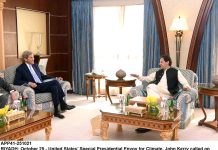KARACHI: A peaceful and stable South Asia will generate dividends for the people of the region and bring economic and trade benefits to the global economy, said Pakistan President Mamnoon Hussain.
While addressing a seminar in connection with the IDEAS 2016, the president said that the world was confronted by new challenges while old security threats are changing to adapt to new technologies. South Asia has shown tremendous resilience and is emerging as one of the fastest growing regions and economic market. Nevertheless, at the bilateral level in South Asia, the inherited legacy of conflict and unresolved disputes persists, constraining each state’s ability to promote economic and social development of its people. The twin phenomena of strategic peril and economic promise pose a daunting challenge, which must be met by South Asia in sync with the great global transformation of our times.
The seminar titled “Stability and the Economics of Regional Peace in South Asia” was jointly organized as part of IDEAS 2016 by the Institute of Strategic Studies Islamabad ISSI and Defence Export Promotion Organization DEPO.The Chairman ISSI Ambassador (Retd.) Khalid Mahmood in his introductory remarks spoke about how the security scenario around the globe was undergoing a major transformation, with a number of variable and invariable factors, each with its own complexity. In the growing context of regional and global connectivity, in which states have started creating frameworks and platforms for enhanced economic cooperation, the China- Pakistan Economic Corridor (CPEC) is a bright light since it presents immense opportunities for promoting the economics of peace in South Asia and beyond.
Maj. Gen. Agha Masood Akram, Director General DEPO emphasised that it is necessary to look into the concept in the backdrop of changed and changing international and regional dynamics. A new international order seems to be emerging defined overwhelmingly by geo-economics rather than geopolitics. The Director General asserted that setting up of the China-Pakistan Economic Corridor and the creation of a new ‘Silk Road’ linking Beijing to its immediate neighbours, would not only dramatically increase regional productivity and trade but was expected to stand as an enduring and tangible expression of China’s material centrality in Asia and beyond.
Chief Editor of South Asia Studies Dr. Ye Hailin stated that CPEC was a crucial corridor for connecting South Asia and Central Asia, as well as West Asia and East Asia, not only geographically and politically but also economically. The CPEC, as well as other initiatives, are meant to further regional and global connectivity. They must have strategic reliability and stability to overcome and surpass traditional geographic problems.
Ambassador Shamshad Ahmad Khan said that Pakistan̵7;s vision of security architecture for South Asia seeks to address the sources of insecurity at bilateral, regional and international levels. The looming strategic peril and imperatives of economic security pose daunting challenges which must be met by South Asia in sync with the great global transformation of our times.












